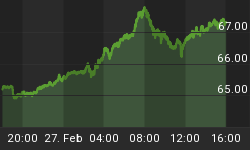Okay, we get it: gold miners are not the same thing as gold. Mining is a business with all kinds of issues that have nothing to do with the metal's price. Shafts can cave in, governments can demand contract revisions or nationalize foreign-owned properties, and energy and labor costs can go up faster than revenues.
Oil, in fact, was probably the main reason that mining shares have tanked recently. Before it can be sold, gold in the ground and has to be dug up and processed, and this takes a lot of energy. So when oil goes up faster than gold, the miners' margins get squeezed, they miss their earnings targets and their stocks sell off.
But the reverse is true as well -- when oil goes down, miners get more profitable. And lately oil has been plunging:
The price of oil is falling again as inventories grow more than expected and signs that global consumption will slow. Benchmark light sweet crude for July delivery lost $1.27 to $86.55 US per barrel in midday trading in New York. Brent crude fell $1.68 to $101.90 per barrel in London.
The U.S. Energy Information Administration said Thursday crude supplies rose by 2.20 million barrels to 384.70 million barrels last week. Analysts had expected a gain of 100,000 barrels.
Because oil is priced in U.S. dollars, a rising greenback -- the result of a flight to safety by investors worried about where the global economy is headed -- added to the downward momentum of oil prices.
And with the price of Canada's biggest commodity export slipping, that also weighed on the Canadian dollar, which reached a low for the year, at under 97 cents US.
Oil is also at a 2012 low, and is headed for its biggest monthly decline since December 2008. Oil has dropped more than 18 per cent so far in May.
Prices are falling on expectations that the world won't use as much oil this year as previously thought. Europe's financial crisis is the most immediate concern, but there have been plenty of signs of weaker demand.
Oil rose near $110 per barrel in February because of the potential for conflict between Iran and the West. Those tensions have eased somewhat, and the market's focus has turned to weak spots in the global economy.
Prices have been falling due to a variety of factors. On Thursday, the U.S. reported that the economy grew by 1.9 per cent in the first quarter, slower than first estimated.
The number of Americans seeking unemployment benefits also rose last week to a five-week high.
Tensions also are easing over Iran's nuclear program, reducing chances for a conflict in the Persian Gulf. And China's manufacturing sector is slowing down while Europe's banking crisis threatens to plunge the region into recession.
Note also that falling oil puts pressure on the currencies of resource economies like Canada. Since miners pay their workers in local currency, a falling C$ makes mining in Canada even less expensive. The result, this past week, was a nice pop in gold mining shares relative to the underlying metal:

No guarantee that this continues of course, but the odds are that it will, if for no other reason than mean reversion. The miners have underperformed gold for so long that a snap-back is overdue, and could be massive once it gains some traction.















